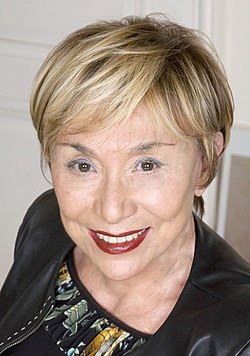Julia Kristeva Quote
Related Quotes
I think that God that we have created and allowed to shape our culture through, essentially Christian theology is a pretty villainous creature. I think that one of the things that male patriarchal fig...
Clive Barker
Tags:
absurdity, atheism, atheist, atrocity, christian theology, church, comfort, corruption, crime, horror
People will say,"there's heaven and hell", and they take it so serious that they look so sorrowful with penitence. I would rather ask them to show me the route that leads to heaven or hell.
Michael Bassey Johnson
Tags:
argument, atheism, atheist, curiosity, curious, disbelieve, doubt, doubting mind, doubting thomas, dream
About Julia Kristeva
Julia Kristeva (; French: [kʁisteva]; born Yuliya Stoyanova Krasteva, Bulgarian: Юлия Стоянова Кръстева; on 24 June 1941) is a Bulgarian-French philosopher, literary critic, semiotician, psychoanalyst, feminist, and novelist who has lived in France since the mid-1960s. She has taught at Columbia University, and is now a professor emerita at Université Paris Cité. The author of more than 30 books, including Powers of Horror, Tales of Love, Black Sun: Depression and Melancholia, Proust and the Sense of Time, and the trilogy Female Genius, she has been awarded Commander of the Legion of Honor, Commander of the Order of Merit, the Holberg International Memorial Prize, the Hannah Arendt Prize, and the Vision 97 Foundation Prize, awarded by the Havel Foundation.
Kristeva became influential in international critical analysis, cultural studies and feminism after publishing her first book, Semeiotikè, in 1969. Her sizeable body of work includes books and essays which address intertextuality, the semiotic, and abjection, in the fields of linguistics, literary theory and criticism, psychoanalysis, biography and autobiography, political and cultural analysis, art and art history. She is prominent in structuralist and poststructuralist thought.
Kristeva is also the founder of the Simone de Beauvoir Prize committee.
Kristeva became influential in international critical analysis, cultural studies and feminism after publishing her first book, Semeiotikè, in 1969. Her sizeable body of work includes books and essays which address intertextuality, the semiotic, and abjection, in the fields of linguistics, literary theory and criticism, psychoanalysis, biography and autobiography, political and cultural analysis, art and art history. She is prominent in structuralist and poststructuralist thought.
Kristeva is also the founder of the Simone de Beauvoir Prize committee.
